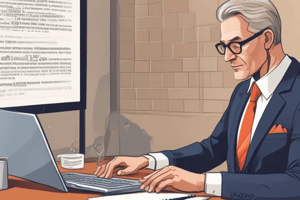Podcast
Questions and Answers
Why is it important for companies to establish email usage guidelines for their employees?
Why is it important for companies to establish email usage guidelines for their employees?
To ensure legal compliance, protect company reputation, maintain professionalism, and safeguard sensitive information.
Explain the difference between a passive and active attack in the context of email security.
Explain the difference between a passive and active attack in the context of email security.
A passive attack involves unauthorized viewing of data without altering the system, while an active attack involves attempts to change or harm the system.
What steps can be taken to avoid copyright infringement when dealing with email attachments?
What steps can be taken to avoid copyright infringement when dealing with email attachments?
Verify the usage rights of the attachment before forwarding or printing it, and include a copyright statement with outgoing emails and attachments.
Describe what 'netiquette' encompasses in the context of email communication.
Describe what 'netiquette' encompasses in the context of email communication.
Why is using strong, regularly changed passwords important for email security?
Why is using strong, regularly changed passwords important for email security?
Identify three types of unacceptable content in professional emails.
Identify three types of unacceptable content in professional emails.
How can spam filters and antivirus software enhance email security?
How can spam filters and antivirus software enhance email security?
Explain how using a company email address contributes to the security and professionalism of email communication.
Explain how using a company email address contributes to the security and professionalism of email communication.
What is the potential impact of harassment and bullying in email communication within a company?
What is the potential impact of harassment and bullying in email communication within a company?
Discuss the importance of including a copyright protection statement in outgoing company emails and attachments.
Discuss the importance of including a copyright protection statement in outgoing company emails and attachments.
Describe a scenario where forwarding an email attachment could potentially violate copyright law.
Describe a scenario where forwarding an email attachment could potentially violate copyright law.
What are the implications of using inappropriate humor or sarcasm in professional emails?
What are the implications of using inappropriate humor or sarcasm in professional emails?
Explain why it's crucial for company email guidelines to adhere to the laws of the country in which the company operates.
Explain why it's crucial for company email guidelines to adhere to the laws of the country in which the company operates.
In what ways can an active attack via email compromise a system?
In what ways can an active attack via email compromise a system?
How does netiquette relate to maintaining a professional online presence?
How does netiquette relate to maintaining a professional online presence?
Can you classify a 'phishing attack' as a passive or active email security threat? Explain your reasoning.
Can you classify a 'phishing attack' as a passive or active email security threat? Explain your reasoning.
How does the use of a company email address (e.g., [email protected]) contribute to email security and prevent 'spoofing'?
How does the use of a company email address (e.g., [email protected]) contribute to email security and prevent 'spoofing'?
If an email contains discriminatory remarks, what steps can be taken by the recipient or the company to address the situation?
If an email contains discriminatory remarks, what steps can be taken by the recipient or the company to address the situation?
What measures should be in place to protect sensitive personal and confidential information exchanged via email?
What measures should be in place to protect sensitive personal and confidential information exchanged via email?
How might a company policy address the use of humor and sarcasm in emails to maintain a professional and respectful communication environment?
How might a company policy address the use of humor and sarcasm in emails to maintain a professional and respectful communication environment?
Flashcards
Unacceptable email content
Unacceptable email content
Private details, discriminatory comments, bullying, foul language, or unsuitable jokes are all examples of this.
Company email guidelines
Company email guidelines
Rules that employees must follow when using email, ensuring legal and professional standards are maintained.
Copyright and Email
Copyright and Email
Using material without permission is against the law, including email attachments. Always verify rights before sharing.
Email Password Protection
Email Password Protection
Signup and view all the flashcards
Passive Attack
Passive Attack
Signup and view all the flashcards
Active Attack
Active Attack
Signup and view all the flashcards
Netiquette
Netiquette
Signup and view all the flashcards
Study Notes
- Email language should adhere to an acceptable code of practice.
Unacceptable Email Content
- Sensitive personal and confidential information is unacceptable in emails.
- Discriminatory remarks are not acceptable in emails.
- Harassment and bullying are unacceptable for emails.
- Offensive language should not be used in emails.
- Inappropriate humor or sarcasm is unacceptable in emails.
Employer Guidelines
- Companies should publish email usage guidelines that comply with the laws of their operating country.
Copyright & Security
- Emails and attachments are subject to copyright laws, so ensure forwarding or printing doesn't infringe copyright.
- Company email addresses should include the company name (e.g., A.N.User@company_name.com).
- Emails and attachments should contain copyright protection statements.
Security and Passwords
- Emails must be protected by strong, regularly updated passwords.
- Spam filters and antivirus software should always be active.
Email Security Attacks
- Passive attack: An unauthorized third party accesses messages, settings, or data without harming the system.
- Active attack: A security breach that changes or harms a system, like malware or phishing.
Netiquette
- Netiquette defines acceptable online behavior for personal and professional use.
Studying That Suits You
Use AI to generate personalized quizzes and flashcards to suit your learning preferences.




